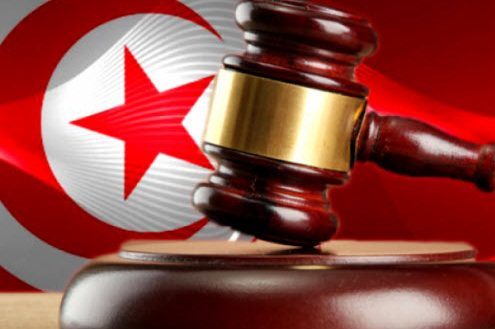The ICJ condemns the use of military courts to try lawyers and politicians and, once again, urges the Tunisian authorities to ensure that all civilian accused of recognizably criminal offences be tried before independent and impartial civilian courts capable of guaranteeing a fair trial.
يمكنكم قراءة وتحميل البيان باللغة العربية عبر هذا الرابط
On 20 January 2023, the Criminal Chamber of the Military Court of Appeal upheld the guilty verdicts of the Military Court of First Instance and issued more severe prison sentences with immediate effect in the so-called Airport Case.
The Court sentenced lawyer and former Member of Parliament (MP) Seif Eddine Makhlouf to one year and two months’ imprisonment for “disturbing the public peace with the aim of committing an offence or opposing the execution of a law and insulting public officials while on duty”. He was imprisoned a few hours after the verdict. The Military Court of Appeal also sentenced lawyer Mehdi Zagrouba for “assaulting public officials on duty” to 11 months’ imprisonment. Mehdi Zagrouba, who is being prosecuted for criticizing the Executive in another case, was also banned from practising as a lawyer for five years. In addition, the Court sentenced former MP Nidhal Saoudi to seven months’ imprisonment for “insulting and threatening public officials”; and former MPs Muhammad Affes and Maher Zaid, for “insulting public officials”, to seven months’ and five months’ imprisonment, respectively.
“Tunisia must stop using military courts to try civilians, including lawyers and politicians, for political ends,” said Said Benarbia, ICJ Middle East and North Africa programme director.
The so-called Airport Case relates to events in March 2021, when members of Parliament from the opposition party “Alkarama,” together with other members of the party, had a confrontation with authorities after they went to Tunis airport to support a woman who was being prevented from travelling. Mehdi Zagrouba went there to provide legal assistance to her.
Tunisian law confers jurisdiction on military courts over cases involving agents of the internal security forces for acts that took place in, or on the occasion of, the exercise of their functions when the alleged facts are related to the maintenance of public order.
The military court proceedings in this case had been initiated in the aftermath of President Kais Saied’s suspension of Parliament under the state of exception on 25 July 2021, following the removal of parliamentary immunity from Seif Eddine Makhlouf, Nidhal Saoudi, Muhammad Affes and Maher Zaid, which they had enjoyed as MPs up to that point.
On 16 May 2022, the Military Court of First Instance had convicted Makhlouf and sentenced him to five months’ imprisonment, Saoudi and Zagrouba to six months, and Affes and Zaid to three months. Both the Prosecution and the defendants appealed.
The military court proceedings have taken place despite the fact that the same case had already been adjudicated before civilian courts, resulting in verdicts for the same offences with respect to Seif Eddine Makhlouf, Nidhal Saoudi, Mehdi Zagrouba and Muhammad Affes. On 21 March 2022, the District Court of Tunis had found Seif Eddine Makhlouf and Mehdi Zagrouba guilty of “assaulting and insulting public officials on duty”, while acquitting Nidhal Saoudi and Muhammad Affes. On 26 May 2022, the Court of First Instance of Tunis had confirmed the District Court of Tunis’s initial verdict in the case, and had sentenced Seif Eddine Makhlouf and Mehdi Zagrouba to a suspended sentence of three months’ imprisonment.
The trial of civilians before military courts is incompatible with international standards, which require that the jurisdiction of military courts be exclusively restricted to cases involving members of the armed forces for narrowly defined military offences.
Under article 14(1) of the International Covenant on Civil and Political Rights (ICCPR), to which Tunisia is as a State party, guarantees to those charged with a criminal offence “a fair and public hearing by a competent, independent and impartial tribunal established by law.” In particular, international standards.
Moreover, the ICJ condemns the violation of article 14(7) of the ICCPR, prohibiting double jeopardy, with respect to Makhlouf, Zagrouba, Saoudi and Affes, who have been tried twice for the same offence arising out of the same facts and alleged conduct.
“Using military courts to try and punish lawyers for an offence for which they have already been convicted, and banning them from legal practice, amount to judicial persecution of the legal profession,” added Said Benarbia.
Background:
Since 25 July 2021, President Saied has taken steps that have served to effectively dismantle the rule of law in Tunisia. They have weakened judicial independence and the judicial protection of human rights, restricted the civic space and stifled the exercise of freedom of expression, including dissent.
Military courts in Tunisia are increasingly targeting civilians, in some cases for publicly criticizing President Kais Saied since he assumed sweeping new powers on 25 July 2021, and targeting lawyers who are acting as the last line of defence against the increasing crackdown on the rule of law and human rights and freedoms. According to the Tunis section of the Tunisian National Bar Association, prosecutions against lawyers have increased, in particular under the recent cybercrime Decree-Law N°54, as attested by the proceedings against Mehdi Zagrouba in another, separate case.
On 8 November 2022, during Tunisia’s fourth Universal Periodic Review, UN Member States expressed concern over the increasing practice of prosecuting civilians, notably journalists and human rights defenders, before military tribunals, and called for the Military Justice Code to be amended to end this practice.




